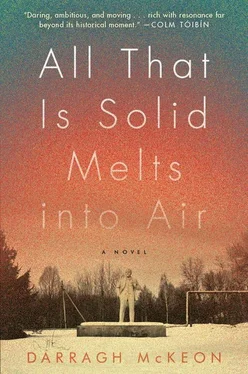“Perhaps.”
“You’ll think about what I said.”
“Perhaps.”
“I’ll let you know about our next gathering. If you decide to stay at home, I’ll understand.”
She nods. “I know.”
When they part she walks down through the pathways between the slalom run, skiers dipping and rising from the undulations of the trail, many of them hunkered down, elbows and head tucked in, trying to extract the maximum speed from such a short, shallow course.
She reaches the pathway by the river and looks up. Pavel is still there, his face cupped in one hand, his gaze resting on the river, on the skaters swooping in the still night. She stays and watches him until he moves off. A man who is used to his own company. A couple stand and kiss right beside him, too close for comfort, but he doesn’t react, following the thread of his thoughts to completion before moving away.
Her walk takes her past the Vorobyovy Gory station, set inside a great glass bridge that funnels the Metro trains from the south to the centre of the city, its struts and girders slicing the ice of the river below into a latticework of shadow.
It’s her favourite part of the city, this walkway. Tree-laden hills curve down into the river. There are no grand statements here, no monolithic towers, no gesticulating statues. The Central Lenin complex is spread out on the opposite side of the river, but the buildings maintain a degree of modesty, their design quietened by the sweep of nature around them.
Nearing Grigory’s apartment, she sees his window on the top floor of a staggered block, in line with the upper reaches of the Andreevsky bridge. The light is off. It’s ten o’clock, too early for him to be in bed. Such a thing would be contrary to his sense of order. He’s out. Maria knows she can’t let the moment go by without some sort of contact: if she passes without leaving a note, she may not have the courage to return.
She stands on the slope in front of the gatepost, looking at the uninhabited apartment, and this is an experience that is not unfamiliar to her: looking at her home and feeling like a stranger. The same anxieties descend. She dreads the possibility of meeting anyone. She smoothes her way into the shadows.
At the door she presses his bell to confirm he’s not there. No answer. She punches in the code on the lock and finds the combination is still the same; the door pops open instantly for her. It’s a short hallway, but wide and well lit. She hasn’t been here since the day she took the last of her belongings, closed the door of the apartment, stumbled down these steps. She can still see the way he stood in their small vestibule, between the large mirror on the wall and the small oval one on the coat stand. Both mirrors bounced his reflection between them, so that before closing the door for the last time, Maria found herself leaving not just him but an endless multitude of him. Standing there, his shoulders wrapped in heartbreak.
The memory overwhelms Maria and she leans against the rows of brass letterboxes and stares down at the chessboard tiles. She runs her hand along the nameplates under each slot and finally comes to his: Grigory Ivanovich Brovkin. She’d hoped that maybe both their names would still be there, but of course hers had been removed. wouldn’t she do the same in his position? Why keep a daily reminder of your loss, your great disappointment, your great failure?
It wasn’t his failure, though, it was hers. She hopes that time has allowed him to relinquish all self-recrimination, releasing him from the wreckage she brought upon him.
Maria takes a notebook and pen from her bag. She leans the pages on her thigh and begins to write. After the first few sentences she hears footsteps on the stairs and looks up to see the caretaker descend towards her.
She nods in greeting. “Good evening, Dmitri Sergeevich.”
He pauses, surprised.
“Maria.”
He doesn’t say her patronymic name. She presumes it would imply too much respect. He has passed her on these stairs before; on a few occasions, walking with a man who was not her husband, making her way to their darkened apartment. Each time, Dmitri Sergeevich had not attempted to hide his distaste at her betrayals. Maria remembers how, on passing him on those occasions, she had wanted to melt into liquid, to trickle down the steps, to flow down the hill and join with the river, where she would become indistinguishable and irrelevant, shapeless and free.
On those two or three occasions he had seen her eyes hollowed with dread and mistaken it for guilt. He had seen her grapple for her keys, attempt to slide one of them into the lock while enduring the full glow of his judgement. He had seen her do this while battling through tears of anger and fear and mistaken them for tears of shame.
She had hated him then, not for his spite but for his inaction. A moment of discretion, a few words to Grigory in a darkened corner under the stairs, was all it would have taken for her to be released from her torment. Instead, he despised her silently and kept his distance from her husband. He watched her life crumble before him and didn’t have the wit to join together the events. He couldn’t read what she was saying to him with her trembling hands, with her smudged eye shadow, with her faltering steps.
He stands at the bottom of the stairs now, unshaven, his clothes rumpled, a radically different figure from the neat, well-groomed man she remembers. She looks at him with the stains on his cardigan, his greasy hair, and is surprised to feel no anger. The man was simply going about his business. He wasn’t responsible for the cruelties of her situation. And, for her part, she is relieved no longer to experience the humiliation that a glance from him would evoke.
In the past few years she has replayed her actions countless times while sitting at her workbench, her limbs functioning independently, her mind back here, and has long since reassured herself of her fidelity, if not in body then in everything else; everything that remained her own, at least, remained his.
“Why are you here, Maria?”
A softness in his voice.
“I’m looking to leave a note for Grigory.” She lifts up her notebook. “I’ll finish and slip it into his letterbox. Can you tell him I called?”
He approaches her, and she flattens the notebook against her chest, instinctively protective. Her humiliation, his hold over her, hasn’t, it seems, entirely passed. He doesn’t reach for the notebook, though; he gently takes her hand. She is too surprised to resist.
“Please, Maria, come and sit.”
“I’d rather not. I was just passing. I hadn’t intended to stay. It’s late and I need to get home.”
“Please, Maria.”
She sits, unnerved.
“Would you like some water?”
“No, thank you.”
Perhaps Dmitri Sergeevich’s opportunities for company have become rare. Perhaps his isolation is causing him to look upon her as an old friend.
“How is your wife, Dmitri Sergeevich? I apologize, I can’t seem to remember her name.”
He waves away her question.
“Grigory isn’t just out for the evening. He’s been gone for months now, Maria.”
“Oh. I see.” She tucks her hair behind her ears. “I didn’t know. But his name is still on the letterbox.”
“Yes. He still lives here officially, he just hasn’t been home in a long time.”
“He never sent word to me, but then, I suppose, why would he?”
“He left quickly. He didn’t have a chance to inform anybody. I myself got a call from his secretary.”
“Did she say where he went?”
Maria is aware that her voice is rising. It’s not like Grigory to act spontaneously.
“She didn’t say exactly. She simply mentioned that there had been an accident in the Ukraine and his skills were needed.”
Читать дальше












